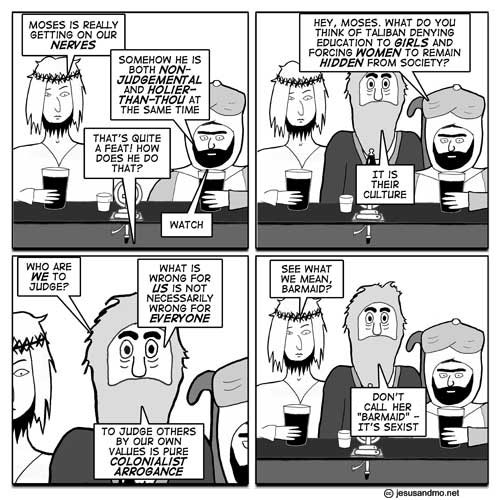Bailing out cartoon moral relativism requires a profound examination of how the medium of cartoons interacts with complex moral dilemmas. At first glance, cartoons often appear simplistic or frivolous, predominantly aimed at entertaining a youthful audience. However, the layering of humor, satire, and social critique within this art form unveils a treasure trove of ethical complexities deserving our attention. This exploration is not merely an academic exercise but a necessary endeavor that can prompt a significant reevaluation of societal values and beliefs through the lens of animated narratives.
In a world increasingly characterized by polarization and divisive ideologies, moral relativism often finds its way into mainstream discourse. The idea that moral principles are not universal but rather fluid and context-dependent is emblematic of contemporary dialogues. Cartoons, with their unique ability to distill intricate concepts into digestible formats, excel at embodying this moral relativism. For instance, the juxtaposition of characters with starkly contrasting views forces viewers to confront the relativity of right and wrong, particularly when faced with dilemmas that possess no clear resolution.
The palette of cartoon moral relativism opens new avenues for critical engagement. Characters emblematic of opposing stances can serve as a microcosm of society itself. Viewers may find themselves cheering for the hero while simultaneously recognizing the villain’s compelling argument. This duality highlights the notion that morality is rarely black and white. It reveals the shades of gray that lie in between, prompting deeper inquiry into the values we claim to hold dear.
Consider the enduring popularity of satirical cartoons. These form a distinctive category that addresses real-world issues while engaging with moral ambiguity. By lampooning political leaders, cultural trends, and social norms, satirical cartoons encourage audiences to question accepted moral frameworks. They subtly instigate a shift in perspective, challenging viewers to reconsider their beliefs and assumptions. Through humor, they dismantle the rigidities of conventional morality, illustrating that ethical truths often vary based on circumstance and perspective.
Moreover, the animation genre has the potential to shape public consciousness concerning moral relativism. For example, iconic shows like “The Simpsons” and “South Park” have addressed contentious issues ranging from racial prejudice to political hypocrisy. By weaving these themes into entertaining narratives, they cultivate an environment in which discussions of morality can unfold naturally. This accessibility allows audiences to engage with complex ideas without feeling overwhelmed by their intricacies.
As viewers navigate through plots that present moral dilemmas, they are compelled to juggle conflicting viewpoints. This engagement with relativism offers both a challenge and an opportunity. It encourages a more nuanced understanding of ethics, paving the way for empathy and open-mindedness. When characters are portrayed with depth—exhibiting both flaws and admirable qualities—viewers disengage from binary perspectives. Instead of a monolithic good versus evil narrative, they may come to appreciate the multifaceted nature of human character and morality.
However, the infusion of moral relativism in cartoons is not without its pitfalls. Critics often argue that it can lead to ethical nihilism, where the absence of absolute moral values breeds confusion and apathy. The critical distinction lies in understanding that moral relativism does not equate to moral permissiveness. The dialogues generated through animated portrayals of ethical ambiguity should not serve as an endorsement of all behaviors as equally valid. Rather, they should provoke thoughtful deliberation on the implications of our choices within the kaleidoscope of the human experience.
An invigorating irony resides within the realm of animated narratives. Despite their inherent exaggeration and caricature, cartoons can inspire genuine dialogue about serious moral issues. Much like a mirror reflecting society, they can reveal underlying tensions and cultural shifts. By presenting relatable characters grappling with ethical questions, they cultivate a sense of community and shared inquiry. This dynamic serves as a vital catalyst for addressing pressing global issues, including climate change.
In the context of environmental activism, cartoons can play a pivotal role in shaping public perceptions. By employing humor and absurdity, animated narratives can demystify complex scientific principles and ignite curiosity regarding climate issues. For instance, characters advocating for conservation measures or grappling with the consequences of environmental neglect embody the moral dilemmas society faces. By highlighting the interconnectedness of human action and ecological sustainability, cartoons can advocate for a more conscious approach to environmental stewardship.
Moreover, animation possesses a formidable capacity to engage younger audiences, encouraging them to embrace their roles as change agents. By presenting environmental challenges through the lens of relativity—acknowledging that perceptions of nature and responsibility differ across cultures and generations—animated narratives can cultivate a fresh understanding of ecological ethics. This generation, armed with the knowledge gleaned from such portrayals, may emerge more adept at navigating the intricate web of moral responsibilities toward the planet.
Ultimately, bailing out cartoon moral relativism invites us to embrace complexity. Rather than shunning the ambiguous gray areas of ethics, we should endeavor to explore them. In doing so, we can foster a culture that values dialogue, empathy, and understanding. It is through the alchemy of humor, character development, and engaging narratives that moral relativism can evolve from a concept into a lived experience, one that encourages us to be better stewards of our world—both ethically and environmentally. In that exploration lies not only a promise of greater understanding but also the potential for profound transformation in how we regard both each other and the world we inhabit.
